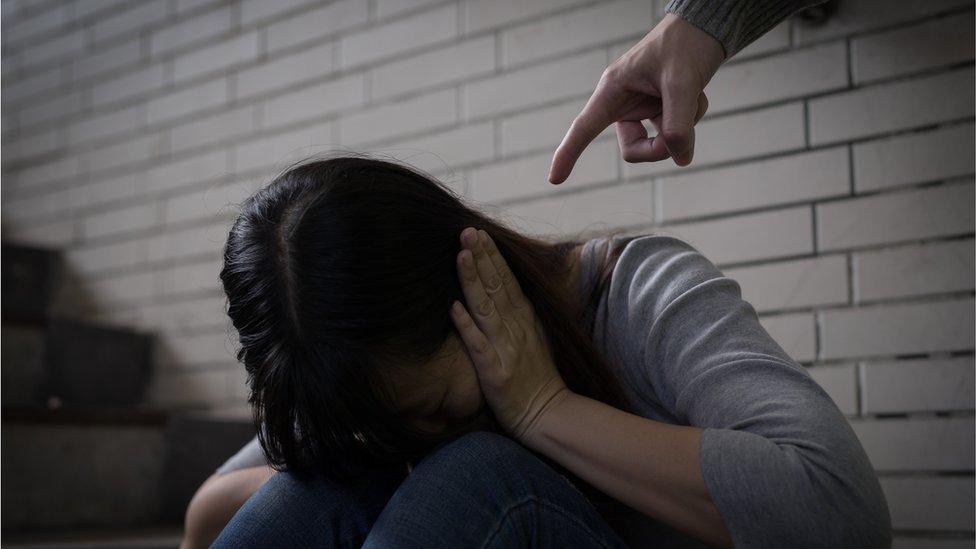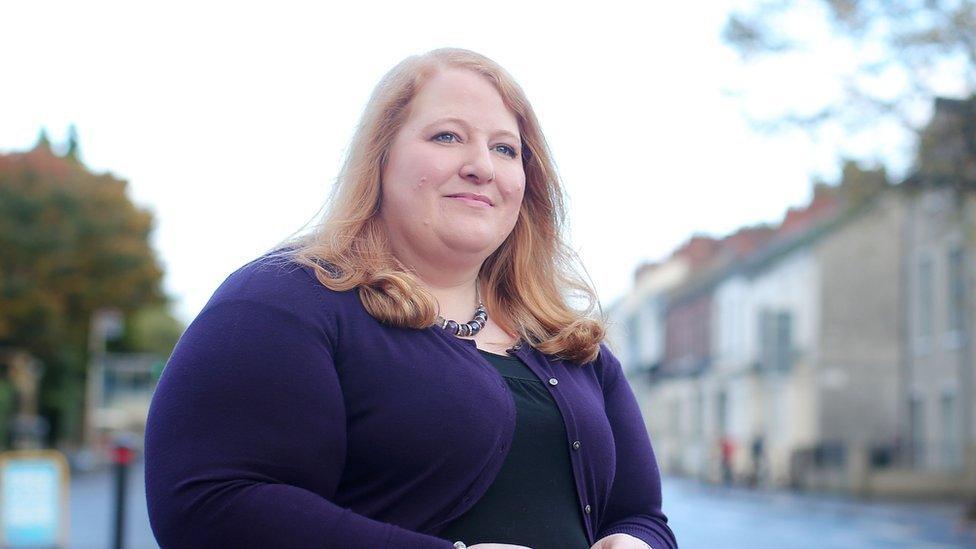Domestic abuse bill for NI closer to becoming law
- Published

Coercive control is to become a criminal offence in Northern Ireland
A landmark bill to strengthen Northern Ireland's domestic abuse legislation is another step closer to becoming law.
MLAs at the Stormont Assembly debated the Domestic Abuse and Family Proceedings Bill into the early hours of Wednesday.
A proposal to amend access to legal aid for some victims of domestic abuse passed after a vote.
Justice Minister Naomi Long had argued her bill was not the "correct vehicle" to address the issue.
During the bill's consideration stage on Tuesday, Green Party MLA Rachel Woods put forward the amendment, which passed by 44 votes to seven, external - 25 Sinn Féin MLAs abstained.
It would effectively widen access to legal aid for victims and survivors in child contact cases.
'Acting in haste'
Mrs Long said while she believed the proposal was "well intentioned" she could not support it as part of the Domestic Abuse bill and feared it would not provide the protection Ms Woods believed it would.
"By acting in haste, we will lose the opportunity for stronger proposals whose impact we better understand," she told the assembly.
"It flies in face of every other department - money will need to be taken to cost this, meaning we could be introducing uncosted and uncapped demand.
"I cannot in good conscience as a member of the executive stand over it."

Justice Minister Naomi Long said she could not support the amendment on legal aid
She said she was in favour of legal aid reform but that the proposal needed detailed drafting and consultation.
The long-awaited bill means domestic abuse offences in Northern Ireland will no longer be limited to physically violent behaviour.
It will make a form of bullying, known as coercive control, an offence in Northern Ireland for the first time.
Convictions for the most serious domestic abuse offences will carry a penalty of up to 14 years in jail.
It also includes provisions for the effect that domestic abuse can have on children, with enhanced sentences possible in cases where:
The victim in a relationship is aged under 18
Where a child sees, hears or is present during an incident of abuse
Where a child is used to abuse a victim
'Tight timeframes'
A previous incarnation of the legislation stalled when Stormont's power-sharing institutions collapsed in 2017.
During almost 12 hours of debate MLAs also backed a number of other amendments to the bill.

MLAs debated the bill into the early hours of Wednesday morning
It includes one from DUP chair of Stormont's Justice Committee, Paul Givan, which requires the Department of Justice to introduce new protection orders within 24 months.
Mrs Long had also opposed it as she said her department was already planning to do this through a separate piece of legislation, and warned against putting tight timeframes on officials.
Mr Givan said the legislation was more important than ever due to a rise in reports of domestic abuse incidents to police during the Covid-19 lockdown.
Sinn Féin's Linda Dillon, deputy chair of the committee, said while the bill was not perfect it was also about protecting children "who not only witness abuse but who are impacted without even knowing that they are impacted".
SDLP MLA Sinead Bradley said the current legislation was outdated and needed to progress quickly to reflect the fact that "domestic abuse is not limited to physical violence".
Doug Beattie of the Ulster Unionists thanked the minister for bringing forward the bill and said he hoped it would also address the issue of parental alienation, which he said was "not just about denying one parent access to a child" but "using that child as a weapon".
The bill is expected to become law within months and has been welcomed by domestic abuse charities in Northern Ireland.